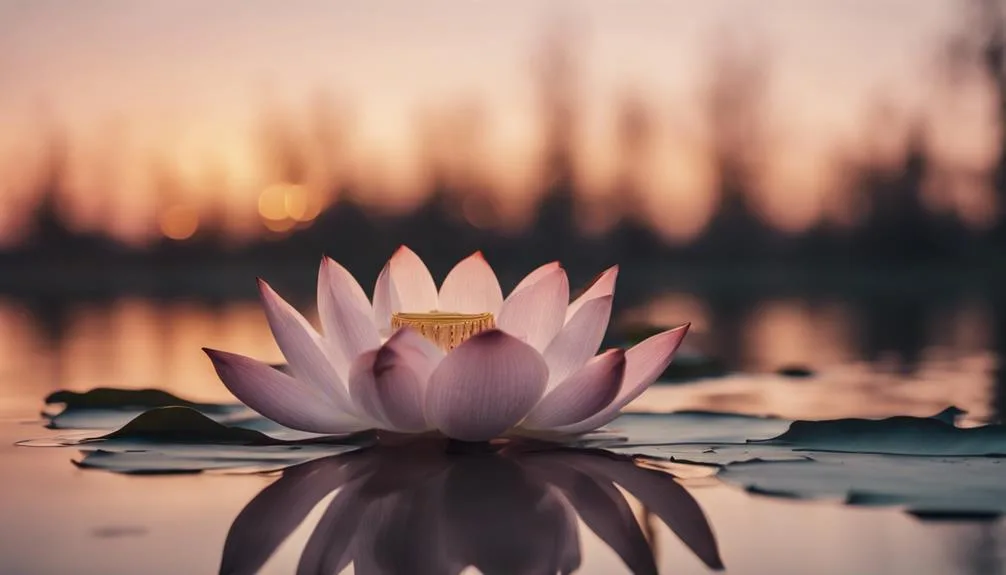Unlocking Buddhism's Layers of Human Suffering
As we find ourselves wrestling with life's inevitable challenges, it's no coincidence that we turn to Buddhism's profound insights on suffering. We're intrigued by how this ancient philosophy dissects the complexity of dukkha, not merely as a fact of life but as a pivotal concept to understand on our path to enlightenment.
Our exploration aims to peel back the layers of suffering, from the tangible pain of our physical existence to the more elusive agonies of our minds and spirits. We invite you to join us on this journey, poised at the edge of uncovering how Buddhism teaches us to confront and ultimately transcend our suffering.
Key Takeaways
- Dukkha encompasses all forms of suffering, from physical pain to emotional unrest.
- Suffering arises from impermanence, ignorance, and the inability to accept change.
- Understanding the true nature of reality is essential for overcoming suffering.
- Buddhist practices offer a path to alleviate suffering by turning inward and cultivating awareness.
Understanding Dukkha
To truly grasp the Buddhist path to enlightenment, we must first understand dukkha, the pervasive nature of suffering that underscores our existence. Exploring mindfulness allows us to observe our experiences without attachment, acknowledging the transient nature of our emotions and thoughts. This practice leads us to a profound realization: our suffering is often rooted in resistance to change and attachment to impermanent states.
Embracing compassion, on the other hand, cultivates a deep empathy towards ourselves and others. It's through compassion that we soften the grip of dukkha, recognizing our shared human condition. This dual approach of mindfulness and compassion not only illuminates the path out of suffering but also fosters a profound connection to the world around us, laying the foundation for genuine happiness and liberation.
The Physical and Emotional Pain
Exploring the realms of physical and emotional pain reveals the intricate ways in which dukkha manifests within our lives, underscoring the profound impact of suffering on the human experience. These layers of suffering challenge us to seek out healing practices and develop coping mechanisms that can alleviate our discomfort.
- Healing practices often incorporate mindfulness and meditation, encouraging us to observe our pain without attachment.
- Coping mechanisms vary widely, from the deeply spiritual to the practical and everyday.
By understanding the nature of our suffering, we can begin to untangle the complex web of causes and conditions that bind us.
This analytical approach allows us to navigate our pain with insight, fostering a deeper connection to the Buddhist path of liberation from dukkha.
The Impermanence Struggle

Humanity's struggle with impermanence unveils a profound layer of suffering, deeply embedded in our resistance to the inevitable changes life presents. We cling to moments, people, and possessions, fearing their loss, which paradoxically leads to greater suffering. This resistance reflects a misunderstanding of life's transient nature.
Accepting impermanence isn't about resignation but understanding the flow of existence. It's about acknowledging that change is the only constant. By embracing this truth, we start finding peace amid life's fluctuations. This acceptance liberates us from the shackles of attachment, allowing a more serene engagement with the world.
It's a journey towards inner peace, where the acknowledgment of impermanence cultivates a deeper appreciation for the present moment, fostering a resilient tranquility against life's inevitable ebbs and flows.
Subtle Sufferings of Pleasure
We often overlook the fact that even in moments of pleasure, seeds of suffering are silently sown, revealing a complex interplay between joy and discomfort in our lives. This subtlety in our experiences highlights the deceptive nature of pleasure and the importance of seeking fulfillment within.
- Pleasure's deceitfulness: It masks the transient nature of happiness, diverting us from the pursuit of inner contentment.
- Illusory happiness: Moments that seem to bring joy often lead to a craving for more, underlining the ephemeral quality of external pleasures.
- Fulfillment within: True peace and happiness are found in understanding and accepting the impermanent nature of life, rather than in the fleeting sensations of pleasure.
In recognizing these subtle sufferings, we foster a deeper awareness and cultivate a path toward genuine well-being.
The Ignorance of Existence

Building on the understanding that even pleasure can seed suffering, it becomes evident that a fundamental ignorance about the nature of existence underpins much of our discomfort. This ignorance's impact extends far beyond mere dissatisfaction, embedding itself deep within our existential framework.
We habitually cling to transient pleasures and material gains, mistaking them for sources of lasting happiness. This misapprehension reveals a profound lack of existential insights, which are crucial for navigating life's inherent uncertainties. By failing to recognize the impermanent nature of existence, we set ourselves up for perpetual cycles of desire and disappointment.
Understanding this ignorance is the first step towards cultivating a more profound awareness of life, one that acknowledges the fleeting nature of our experiences without becoming ensnared by them.
Overcoming Suffering Through Insight
Gaining insight into the true nature of existence, we unlock the potential to transcend the pervasive cycle of suffering that binds us. This path towards freedom isn't merely about intellectual understanding; it involves cultivating a deep, insightful awareness that leads to profound inner transformation. Through this process, we begin to see the impermanent, unsatisfactory, and selfless nature of all phenomena, which in turn, diminishes our attachment and aversion, the root causes of suffering.
Insightful awareness breaks the chains of ignorance, revealing the reality beyond our conditioned perceptions.
Inner transformation shifts our response to life's challenges, fostering resilience and equanimity.
Understanding the impermanence of all things helps us let go of clinging, reducing our suffering.
Thus, insight becomes the key to unlocking a life of deeper understanding and peace.
Meditation and the Path Forward

Meditation serves as a vital tool in the quest to comprehend and transcend the multifaceted nature of suffering, marking a pivotal step toward enlightenment and inner peace. Through mindful reflection, we uncover the layers of our experiences, distinguishing between mere perceptions and the essence of what truly is. This journey fosters a profound sense of inner peace, as we learn to navigate life's challenges with grace and equanimity.
| Aspect of Meditation | Benefit |
|---|---|
| Mindful Reflection | Unveils the true nature of experiences, leading to clarity and insight. |
| Focus on the Present | Cultivates a grounded awareness, reducing anxiety and stress. |
| Emotional Regulation | Enhances our ability to manage emotions, fostering resilience. |
| Compassion Cultivation | Encourages a deep empathy for oneself and others. |
| Path to Enlightenment | Directs us toward ultimate liberation from suffering. |
In embracing meditation, we embark on a transformative path, guiding us toward a life of balance and serenity.
Frequently Asked Questions
How Do Buddhist Teachings Reconcile the Concept of Dukkha With the Pursuit of Happiness in Life?
We've found that Buddhist teachings address the happiness paradox by advocating suffering acceptance. By understanding and embracing dukkha, we can pursue true happiness, seeing beyond temporary pleasures to a deeper, more sustainable joy.
In What Ways Can Understanding the Nature of Suffering Contribute to Better Interpersonal Relationships and Empathy Towards Others?
We've found that understanding suffering deepens empathy, enhancing our relationships. By recognizing each other's struggles, we foster compassion, improving the dynamics within our connections. This empathy training becomes a cornerstone for meaningful interactions and mutual support.
How Do Buddhist Practices Address the Suffering Caused by Societal and Systemic Issues, Such as Inequality and Injustice?
We're exploring how Buddhist practices, through compassionate activism and mindful economics, tackle societal woes. They offer a lens to view inequality and injustice, urging us to transform personal enlightenment into collective liberation.
Can the Acknowledgment of Dukkha Lead to a More Environmentally Conscious and Sustainable Way of Living?
We believe acknowledging dukkha can inspire a shift towards green consumerism and eco-monasticism, fostering a sustainable lifestyle by recognizing the interconnectedness of all life and the impermanence of material satisfaction.
How Does the Concept of Dukkha Align With Modern Psychological Understandings of Trauma and Healing?
As they say, knowledge is power. We find that dukkha's framework aligns with modern psychological approaches to trauma and healing, offering insight into trauma narratives and advocating for healing rituals that resonate deeply with scholarly analyses.
Conclusion
As we've journeyed together through Buddhism's understanding of suffering, we've unraveled its complex layers, from the tangible pain of existence to the subtler agonies of impermanence and pleasure.
But, the path to liberation beckons, shrouded in the practice of mindfulness and meditation. The key to unlocking the cessation of dukkha lies within our reach, yet demands profound insight and unwavering dedication.
Will we rise to the challenge, embracing the wisdom laid before us? The next steps are ours to take, promising enlightenment for those who dare to tread this ancient path.






